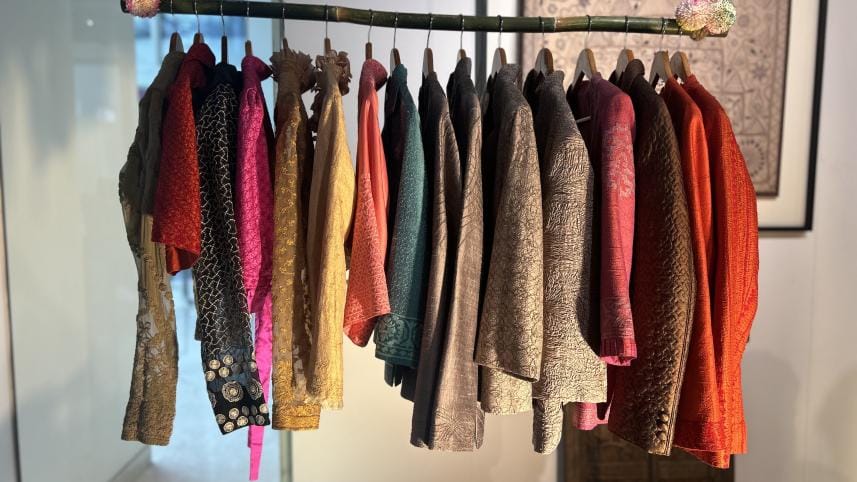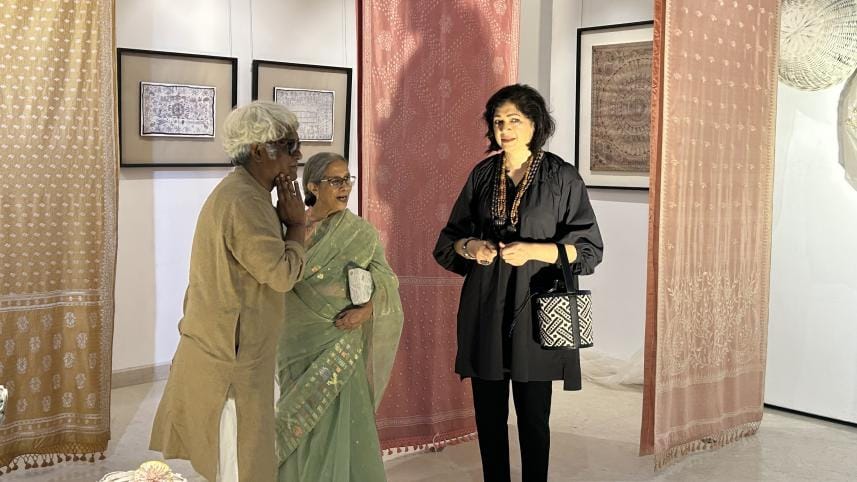Designer Maheen Khan weaves heritage into the present at Baishakhi Festival

As part of the Bengali New Year festivities, the exhibition, Baishakhi Festival, opened at Bay's Edge Gallery in Dhaka. Curated by designer Maheen Khan, the event showcased handwoven silk saris, jackets, nakshi katha, and more. The exhibition was supported by Hyundai, UCB, and Berger.
"In my experience, I had the opportunity to connect with rural craft," Maheen Khan shared. "Since then, I've explored local artisanal innovations, blending the old with the new."
That blend is what made the exhibition stand out.

Every piece on display—whether a sari or jacket—came from silk woven in Chapainawabganj, Rajshahi. The silk is produced on handlooms by a cluster of weavers who live by the banks of the Mahananda River, using the same traditional techniques passed down for generations.
"I believe designing is an artistic vocabulary. And for craft to survive, it has to adapt — to take on modern function and even push the limits of tradition," she added.
"The embroidery used in the collection followed this philosophy," Khan explained. "With just a simple running stitch, artisans created intricate patterns inspired by local stories and translated into complex geometric motifs."
Advisor to the Ministry of Fisheries and Livestock, Farida Akhter, was present at the inauguration of the event, along with the Ambassador of France Her Excellency Mrs. Marie Masduputy.
A long-time advocate for ecological agriculture and women's rights, Akhter reflected on the relationship between craft and nature.
"The structure and scales of fish have a pattern of their own," she said. "I've seen women weave nature into their designs, even based on the hour of the day. It's fascinating how closely it's all related to life."
Ambassador Masduputy, on the other hand, shared her excitement to walk through these designs. She added that despite Bangladesh having a reputation for readymade garments, perhaps now is the time to shed light on its artistry as well.
The evening included a short fashion show, where models walked through the gallery in handwoven saris and tailored silk jackets. Each piece flowed with ease, showing how traditional fabrics could be shaped into modern, wearable designs without losing their essence. Nothing excess, no overstatement — just a quiet confidence in the craftsmanship.
The event was attended by a diverse group of guests including Syeda Rezwana Hasan, along with other respected cultural and diplomatic figures. Their presence underscored how craft, culture, and sustainability often intersect — and why events like this matter.
"This is not about preserving the past in a museum sense," Maheen Khan said. "It's about evolving it, letting it find purpose in the present."
The exhibition did not feel like a nostalgia project. It was grounded in the present, with pieces that were functional, thoughtful, and ready to be worn and lived in. More than anything, it reminded us that heritage is not static. It's always adapting, always moving forward.
Photo: Nusrath Jahan



 For all latest news, follow The Daily Star's Google News channel.
For all latest news, follow The Daily Star's Google News channel.
Comments